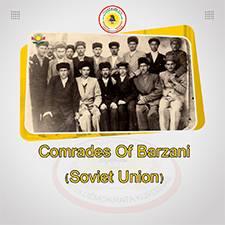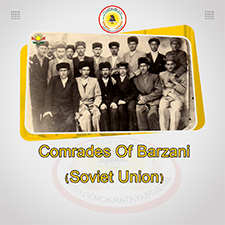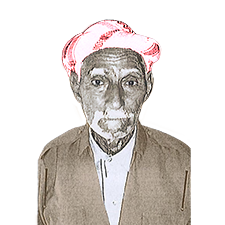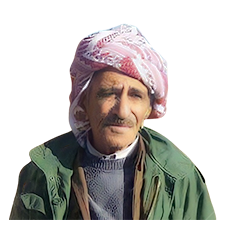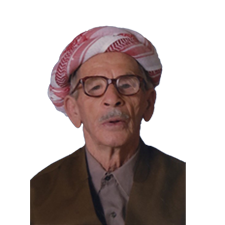Biography
Suleyman Hakim Yasin was born in Pendro village in Sherwanmazin sub district in Mergasor district in Erbil governorate in 1928, on the 21st of June 1932 he with his family became refugees of Turkey. He returned to Kurdistan in 1933, after the second Barzan Revolution ended he entered the Republic of Kurdistan in Mahabad, where he was able to study up to the third grade in the middle school. He studied Russian language and political law in the Soviet Union until 1950, then in 1952 he was accepted to the Department of Agriculture of the University of Tashkent. After completing his studies, he was appointed as an officer in the Agricultural Administration of Tashkent. He married Lida in the Soviet Union, In 1959, he became the Russian language lecturer at the Al-Mustansiriyah University While he was a lecturer at the agricultural department at the same university. He was employed on March 11, 1970 as an employee at Erbil's department of Agriculture, and returned to Erbil in 1977 benefiting from the general amnesty and was employed for the second time in Erbil's department of Agriculture. He passed away in Erbil, on November 15, 2011.
Memoir of struggle
In 1945, he joined the ranks of the Second Barzan Revolution, and on August 19, 1945, by the decree of the Iraqi Military Court, all the moveable and immoveable properties were seized. On September 5, 1945, he participated in the capture of the Police Station of Morik Square, after the failure of the second Revolution of Barzan on 11 October 1945 he goes toward the east of Kurdistan. On March 31, 1946, he became a Peshmerga in Barzani forces of the Kurdistan Democratic Republic’s Army in Mahabad and was awarded the rank of officer, was responsible for distributing rations and supplies of the Saqiz and Sardasht battles, after the collapse of Kurdistan Democratic Republic he participated in the battles of Khalawa, and Jaldyani in east of Kurdistan.
He was one of the Peshmerga who returned to The Sherwan and Mazuri area through Northern Kurdistan land on 19 April 1947 through (khwakurk and the Barazagrawa plains).
After their return, General Mustafa Barzani held a meeting with his comrades in Argosh village on May 15, 1947, and allowed them to decide to stay, or go to the Soviet Union, where all his comrades decided to continue and go to the Soviet Union. On May 23, 1947, he accompanied General Mustafa Barzani to the Soviet Union and participated in the Battle of the stream of Qatur and the Battle of the Mako Bridge. After many hardships and hard work, he crossed the Aras River, which is located in the border between Iran and the Soviet Union, into the Soviet Union.
After their arrival in the Soviet Union, on June 19, 1947, they were placed with all their comrades in the city of Nakhchawan, the Republic of Azerbaijan, for forty days in a deserted community surrounded by barbwires and was guarded by a group of soldiers, and regarding food, clothing, and mobility they were treated as prisoners of war. Later, on the decision of the Soviet government, they were distributed over the areas of Aghdam, Lachin, Aywlakh and Kalbajar in Azerbaijan. On December 10, 1947, they were transferred to a military base on the Khazar Sea in The Capital of Azerbaijan, Baku, and on the 23th of the same month, they were given military uniforms and were trained eight hours a day under the supervision of Azerbaijani officers. At the same time, for four hours a day, they were taught Kurdish language lessons by the comrades who were literate.
After Jafaar Bagrov's ill treatment of his comrades, Barzani decides to move his military camp from Azerbaijan to the Chirchik community close to Tashkent, the capital of Uzbekistan, where they will continue their military training.
In March 1949, he and his friends were distributed as units into the rural villages of the Soviet Union by train and worked in the Kolkhoz farms (land that people rented from the government and then paid back the government shares).
After much effort and many letters sent by General Barzani to Stalin, a letter finally arrives in Stalin's hand in which Barzani discusses the problems of his comrades and immediately decides to form a committee to investigate the situation of Barzani's comrades, and finally the committee's decision is to gather them all in the city of Vrivski, so he will go to the Soviet city of Vrivski in November 1951.
Following the revolution of July 14, 1958 in Iraq and the return of General Mustafa Barzani, on February 25, 1959, in accordance with both Articles three and Seven and section (A) of Article Ten, and working with article 11, in accordance with the amended law No. 19 of 1959, he and his comrades were subjected to general amnesty.
In 1958, the Republic of Iraq was established under the presidency of Abd al-Karim Qasim, who returned to Kurdistan on April 16, 1959, with his friends on the Groza ship via Basra port in the south of the republic of Iraq.
In 1961, he participated in the September revolution, participated in the fights of Rekaniyakan, Zebaris, and Sidakan, he was injured in the village of Girbish, and was treated in the cave of Zuragivani in the vicinity of Rezan, in 1963 he participated in the Battle of Shela-Barazi and was injured for the second time, in 1974 he took up arms and went to Galala, In 1975, after the fail of September Revolution he became a refugee in the Kingdom of Iran and settled in Jahrom.
On the 15th of December 2010 in the 13th Congress of the Kurdistan Democratic Party, because of its struggles and endeavor in the Second Revolution of Barzan, the Kurdistan Democratic Republic, his Path to the Soviet Union and the September Revolution he has been given the Barzani Medal by President Masoud Barzani.
Sources:
-
حامید گهوههری، میدالیای بارزانی بهرزترین خهڵاتی ڕێزلێنان، بهرگی دووهم، (ههولێر - چاپخانهی حاجی هاشم - ٢٠١٥ز).
-
حهمید گهردی، پوختهی مێژوونامه، چاپی یهكهم، (ههولێر - دهزگای چاپ و بڵاوكردنهوهی ئاراس - چاپخانهی وهزارهتی پهروهرده - ٢٠٠٤ز).
-
شهعبان عهلی شهعبان، ههندێك زانیاری سیاسی و مێژوویی، چاپی سێیهم، (ههولێر - چاپخانهی رۆژههڵات - ٢٠١٣ز).
-
عهبدولڕهحمان مهلا حهبیب ئهبوبهكر، عهشیرهتی بارزان له نێوان ١٩٣١ - ١٩٩١، چاپی یهكهم، (ههولێر - چاپخانهی وهزارهتی رۆشنبیری - ٢٠٠١ز).
-
كاروان محهمهد مهجید، بارزانییهكان له مههابادهوه بۆ سۆڤێت، چاپی یهكهم، (سلێمانی - چاپخانهی پهیوهند - ٢٠١١ز).
-
له یادداشتی فهرماندهی شههید حهسۆ میرخان ژاژۆكی، ٦٢ رۆژ لهگهڵ بارزانی دا چوونی بارزانییهكان بۆ یهكێتی سۆڤێت، چاپی یهكهم (ههولێر - چاپخانهی رۆشنبیری - ١٩٩٧ز).
-
لیث عبدالمحسن جواد الزبیدي، ثورة ١٤ تموز ١٩٥٨ في العراق، (بغداد - دارالرشید للنشر - ١٩٧٩م).
-
مەسعود بارزانی، بارزانی و بزوتنهوهی رزگاریخوازی كورد ١٩٣١ - ١٩٥٨، (دهۆك - چاپخانهی خهبات - ١٩٩٨ز).
-
نهجهف قولی پسیان، له مهابادی خوێناوییهوه ههتا لێوارهكانی ئاراس، و. شهوكهت شێخ یهزدین، چاپی یهكهم، (پیرمام - یۆبیلی زێڕینی پارتی دیموكراتی كوردستان - ١٩٩٦ز).
-
ئـ.د.ئـ، فایلی ژماره AI-١٠، لیستی ههڤاڵانی مستهفا بارزانی بۆ یهكێتی سۆڤێت، بهڵگهنامه لهلایهن سهگڤان هاڵۆ پێشكهش كراوه، ٢٠١٦ز.
-
ئـ.د.ئـ، فایلی ژماره٤٢٧-HB، پارتی دیموكراتی كوردستان، بارهگای بارزانی، لێژنهی باڵای ناوچهی بارزان، فۆرمی سلێمان حەکیم یاسین، پیرمام، ١ تشرینی دووهمی ٢٠١٨




